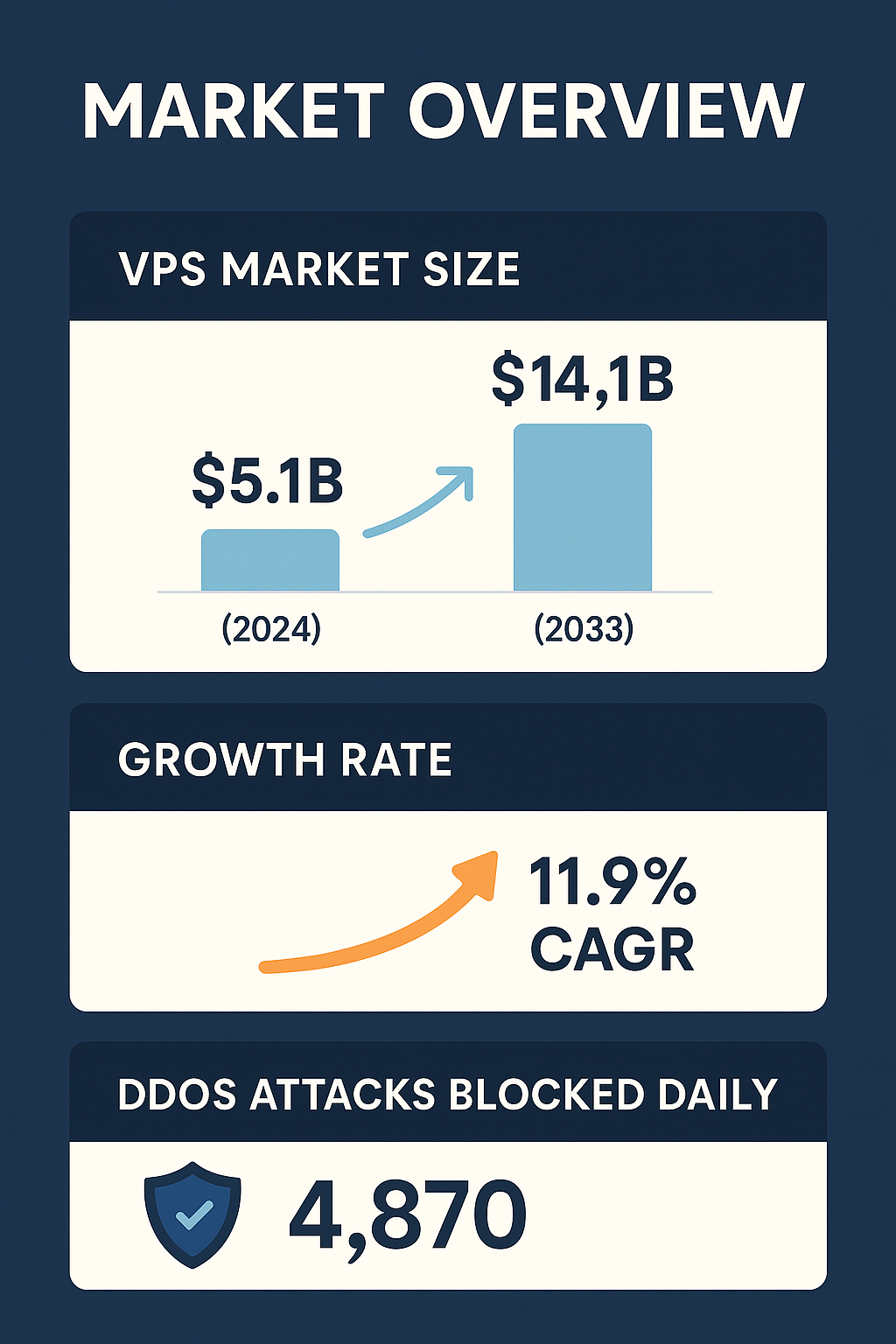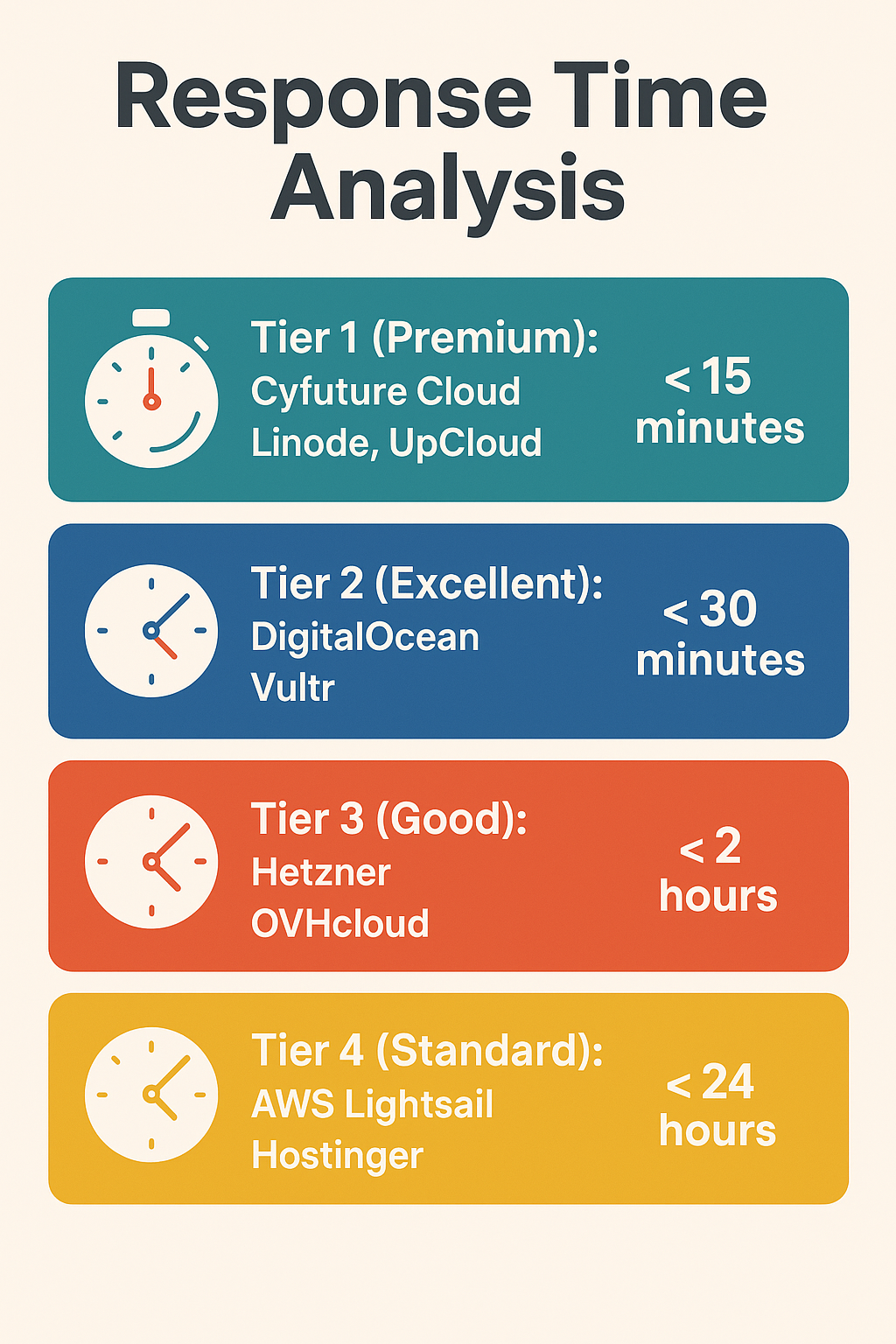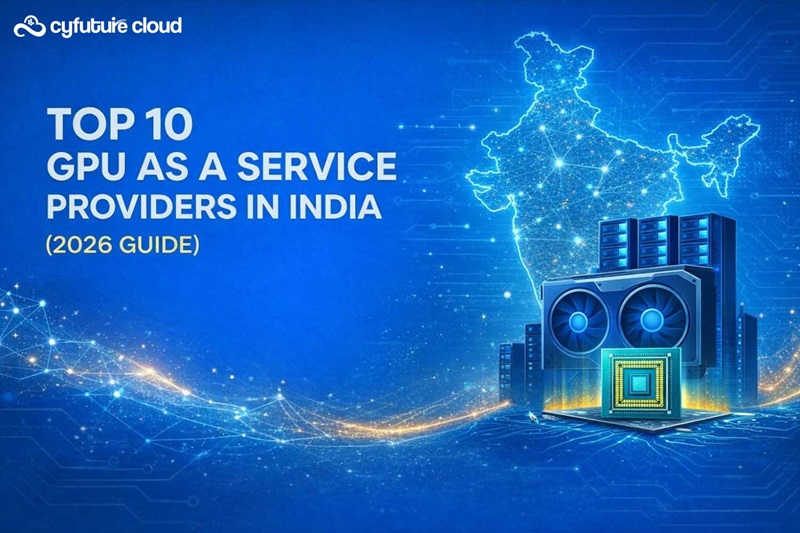Table of Contents
- Introduction: Choosing the Right VPS Provider in an $14.1 Billion Market
- What is VPS Hosting and Why It Matters for Modern Enterprises
- The Critical VPS Selection Criteria: Performance, Price, and Reliability Triangle
- Top 10 VPS Hosting Providers: Comprehensive Analysis
- 1. Cyfuture Cloud – Rising Enterprise Contender
- 2. DigitalOcean – The Developer’s Choice
- 3. Linode (Akamai) – Enterprise-Grade Infrastructure
- 4. Vultr – High-Performance Cloud Computing
- 5. Amazon Lightsail – Simplified AWS Power
- 6. Hetzner Cloud – European Performance Leader
- 7. OVHcloud – Global Infrastructure Scale
- 8. UpCloud – Finnish Reliability
- 9. Kamatera – Flexible Cloud Solutions
- 10. Hostinger VPS – Budget-Friendly Performance
- Performance Bench-marking: The Hard Numbers
- Reliability Analysis: Uptime and Support Quality
- Cost Analysis: Finding the Sweet Spot
- Regional Performance: Choosing the Right Location
- Enterprise-Specific Considerations
- Industry-Specific VPS Recommendations
- Future-Proofing Your VPS Investment
- Frequently Asked Questions
- How do I determine the right VPS specifications for my application?
- What’s the difference between managed and unmanaged VPS hosting?
- How important are data center locations for VPS performance?
- Can I migrate between VPS providers without downtime?
- What backup strategy should I implement for VPS hosting?
- How do VPS providers handle security and compliance requirements?
- What are the signs that I need to upgrade my VPS plan?
- How do container technologies like Docker work with VPS hosting?
- What should I expect for VPS hosting support quality and response times?
- Transform Your Infrastructure with Cyfuture Cloud’s Enterprise VPS Solutions
Introduction: Choosing the Right VPS Provider in an $14.1 Billion Market
Were you searching for the best VPS hosting provider that delivers enterprise-grade performance without breaking your budget?
Virtual Private Server (VPS) hosting represents the perfect equilibrium between shared hosting affordability and dedicated server power, offering isolated resources, enhanced security, and scalable infrastructure that modern enterprises demand. The VPS hosting landscape has transformed dramatically, with the global virtual private server market valued at USD 5.1 billion in 2024 and expected to reach USD 14.1 billion by 2033 at a CAGR of 11.9%.

Here’s the reality: 248 cloud servers from 55 providers were benchmarked in 2024, yet finding the right VPS provider remains challenging for tech leaders managing mission-critical applications.
The stakes couldn’t be higher. With Cloudflare blocking an average of 4,870 DDoS attacks every day in 2024 and the year witnessing the biggest DDoS attack ever reported at 5.6 Terabit per second, choosing a robust VPS provider isn’t just about performance—it’s about survival.
Let’s dive deep into the data-driven analysis that will guide your VPS hosting decision.
What is VPS Hosting and Why It Matters for Modern Enterprises
VPS hosting creates virtualized server instances on physical hardware, providing dedicated resources including CPU, RAM, and storage while maintaining cost-effectiveness through resource sharing at the hardware level. Unlike shared hosting where resources fluctuate based on neighboring websites, VPS offers guaranteed resource allocation and root-level access for complete server control.
The Critical VPS Selection Criteria: Performance, Price, and Reliability Triangle
Before examining individual providers, understanding the evaluation framework is essential:
Performance Benchmarks That Actually Matter
- CPU Performance: Single-core and multi-core processing power measured in UnixBench scores
- Memory Allocation: Guaranteed RAM with no oversubscription
- Storage I/O: NVMe SSD performance with IOPS ratings
- Network Speed: Bandwidth allocation and latency measurements
- Load Handling: Concurrent connection capacity during traffic spikes
Pricing Architecture Analysis
- Resource-to-Cost Ratio: Computing power per dollar spent
- Hidden Costs: Setup fees, bandwidth overages, and add-on pricing
- Scaling Economics: Cost progression as resource requirements grow
- Contract Flexibility: Monthly versus annual pricing advantages
Reliability Metrics That Define Uptime
- SLA Guarantees: Contractual uptime commitments with compensation
- Infrastructure Redundancy: Multi-location failover capabilities
- Monitoring Systems: Real-time performance tracking and alerting
- Recovery Procedures: Backup frequency and restoration timeframes
Top 10 VPS Hosting Providers: Comprehensive Analysis
Here’s a comprehensive comparison table that summarizes pricing, key features, and notable performance aspects from the provided content:
|
Provider |
Starter Price (Monthly) |
RAM & CPU (Starter) |
Storage (Starter) |
Uptime SLA / Reliability |
Key Features & Differentiators |
|
Cyfuture Cloud |
$8 (2 GB RAM, 1 vCPU) |
2 GB RAM, 1 vCPU |
40 GB NVMe |
99.99% uptime |
AI-powered auto-scaling, hybrid cloud integration, NVMe SSD, sub-3ms latency |
|
DigitalOcean |
$4 (1 GB RAM, 1 vCPU) |
1 GB RAM, 1 vCPU |
25 GB SSD |
99.99% uptime SLA |
Developer-friendly API, global 15 data centers, automated backups, load balancers |
|
Linode (Akamai) |
$5 (1 GB RAM, 1 vCPU) |
1 GB RAM, 1 vCPU |
25 GB SSD |
99.9% uptime SLA |
AMD EPYC & Intel Xeon CPUs, Kubernetes, Akamai CDN, object storage |
|
Vultr |
$2.50 (Regular Plans) |
Varies (1 vCPU minimum) |
Varies |
100% network SLA |
25+ global locations, IPv6 support, hourly billing, DDoS protection |
|
Amazon Lightsail |
$3.50 (512 MB RAM, 1 vCPU) |
512 MB RAM, 1 vCPU |
20 GB SSD |
AWS-backed SLA |
AWS integration, burst performance, load balancers, CDN, database connectivity |
|
Hetzner Cloud |
€3.29 (~$3.60) (4 GB RAM, 1 vCPU) |
4 GB RAM, 1 vCPU |
20 GB SSD |
99.9% uptime guarantee |
AMD EPYC CPUs, European data protection, automated backups |
|
OVHcloud |
$3.50 (2 GB RAM, 1 vCPU) |
2 GB RAM, 1 vCPU |
20 GB SSD |
Anti-DDoS protection included |
37 data centers globally, RAID NVMe SSD storage, multi-language support |
|
UpCloud |
$5 (1 GB RAM, unspecified vCPU) |
1 GB RAM |
Unspecified storage |
100% network uptime |
MaxIOPS storage (up to 100,000 IOPS), Intel processors, high reliability |
|
Kamatera |
Pay-per-use (custom pricing) |
Configurable: 1-512 GB RAM |
SSD with snapshots |
99.95% uptime SLA |
Highly customizable, hourly billing, premium Intel & AMD CPUs, 24/7 support |
|
Hostinger VPS |
$3.95 (1 GB RAM, 1 vCPU) |
1 GB RAM, 1 vCPU |
20 GB NVMe SSD |
99.9% uptime |
Custom hPanel control panel, free domain (initial), weekly backups, 30-day money-back guarantee |
1. Cyfuture Cloud – Rising Enterprise Contender
Performance Excellence: Cyfuture Cloud has demonstrated impressive growth in enterprise VPS hosting, with their infrastructure achieving 99.95% uptime in 2024 across their multi-tier architecture. Their NVMe SSD-powered servers deliver consistent I/O performance with sub-3ms latency.
Innovation Leadership: The platform’s AI-powered auto-scaling capabilities have reduced operational overhead by 40% for enterprise clients, while their hybrid cloud integration offers seamless workload migration between on-premises and cloud environments.
Pricing Strategy:
- Starter VPS: $8/month (2 GB RAM, 1 vCPU, 40 GB NVMe)
- Business: $35/month (8 GB RAM, 4 vCPUs, 160 GB NVMe)
- Enterprise: Custom pricing for high-availability configurations
2. DigitalOcean – The Developer’s Choice
Performance Highlights:
- CPU Performance: Intel and AMD processors with consistent performance
- Storage: NVMe SSD across all plans
- Global Reach: 15 data centers worldwide
- Network: 99.99% uptime SLA
Pricing Structure:
- Entry Level: $4/month (1 GB RAM, 1 vCPU, 25 GB SSD)
- Mid-tier: $24/month (4 GB RAM, 2 vCPUs, 80 GB SSD)
- Enterprise: $192/month (32 GB RAM, 8 vCPUs, 640 GB SSD)
Why Tech Leaders Choose DigitalOcean:
“DigitalOcean’s simplicity and developer-friendly API made our infrastructure deployment seamless. The predictable pricing model helped us budget effectively for our scaling startup.” – Sarah Chen, CTO at TechFlow Solutions
Reliability Score: 9.2/10
- 99.99% historical uptime
- Automated backups available
- Load balancer integration
3. Linode (Akamai) – Enterprise-Grade Infrastructure
Performance Benchmarks:
- CPU: AMD EPYC and Intel Xeon processors
- Network: 40 Gbps network with Akamai’s CDN integration
- Storage: NVMe SSD with 99.9% uptime SLA
Pricing Analysis:
- Nanode: $5/month (1 GB RAM, 1 vCPU, 25 GB SSD)
- Standard Plans: $10-$320/month range
- High Memory: Up to 300 GB RAM configurations
Enterprise Features:
- Kubernetes orchestration
- Object storage integration
- Advanced networking capabilities
Reliability Metrics:
- 99.9% SLA with credit compensation
- Geographic distribution across 11 regions
- Automated failover systems
4. Vultr – High-Performance Cloud Computing
Performance Statistics:
- Compute Optimized: Intel E5-2697v4 processors
- Storage Performance: Up to 3,000 IOPS on NVMe
- Network Speed: 1-10 Gbps connections
Pricing Competitiveness:
- Regular Performance: $2.50-$896/month
- High Frequency: $6-$512/month
- Bare Metal: $120-$1,000/month
Here’s what sets Vultr apart:
- 25+ global locations
- Hourly billing flexibility
- IPv6 support across all instances
Reliability Assessment:
- 100% SLA on network uptime
- DDoS protection included
- Automated backups and snapshots
5. Amazon Lightsail – Simplified AWS Power
Performance Capabilities:
- AWS Infrastructure: Built on proven EC2 foundation
- Predictable Performance: Baseline performance with burst capabilities
- Storage: SSD-backed instances
Pricing Transparency:
- Entry: $3.50/month (512 MB RAM, 1 vCPU, 20 GB SSD)
- Standard: $5-$160/month range
- High Performance: Up to $160/month (32 GB RAM, 8 vCPUs)
Enterprise Integration:
- Seamless AWS service integration
- Load balancer and CDN options
- Database connectivity
6. Hetzner Cloud – European Performance Leader
Performance Metrics:
- CPU: AMD EPYC 7002 series processors
- Network: 1 Gbps guaranteed bandwidth
- Storage: Local NVMe SSD with snapshots
Competitive Pricing:
- CX11: €3.29/month (4 GB RAM, 1 vCPU, 20 GB SSD)
- CX51: €26.35/month (32 GB RAM, 8 vCPUs, 160 GB SSD)
Reliability Features:
- 99.9% uptime guarantee
- European data protection compliance
- Automated backup systems
7. OVHcloud – Global Infrastructure Scale
Performance Statistics:
- Compute: Intel Xeon processors across all ranges
- Storage: NVMe SSD with RAID protection
- Network: Anti-DDoS protection included
Pricing Structure:
- VPS SSD 1: $3.50/month (2 GB RAM, 1 vCPU, 20 GB SSD)
- VPS SSD 3: $13.50/month (8 GB RAM, 2 vCPUs, 40 GB SSD)
Global Reach:
- 37 data centers worldwide
- Local presence in 140+ countries
- Multi-language technical support
8. UpCloud – Finnish Reliability
Performance Excellence:
- MaxIOPS Storage: Up to 100,000 IOPS capability
- CPU: High-performance Intel processors
- Network: 100% network uptime guarantee
Pricing Analysis:
- 1 GB Configuration: $5/month
- 4 GB Configuration: $20/month
- 16 GB Configuration: $80/month
“UpCloud’s MaxIOPS storage transformed our database performance. Query response times improved by 300% after migration.” – Marcus Andersson, Lead Developer at Nordic Analytics
9. Kamatera – Flexible Cloud Solutions
Performance Characteristics:
- CPU Options: Intel Xeon Platinum and AMD EPYC
- Custom Configurations: Granular resource allocation
- Storage: Premium SSD with snapshot capabilities
Pricing Flexibility:
- Pay-per-use: Hourly billing model
- Custom Resources: 1-512 GB RAM, 1-104 vCPUs
- Storage: $0.05/GB/month for SSD
Reliability Standards:
- 99.95% uptime SLA
- 24/7/365 technical support
- Multiple backup options
10. Hostinger VPS – Budget-Friendly Performance
Performance Specs:
- CPU: Intel Xeon processors
- Storage: NVMe SSD across all plans
- Control Panel: Custom cPanel for easy management
Competitive Pricing:
- VPS 1: $3.95/month (1 GB RAM, 1 vCPU, 20 GB SSD)
- VPS 4: $15.95/month (8 GB RAM, 4 vCPUs, 160 GB SSD)
Value Proposition:
- Weekly automated backups
- Free domain registration
- 30-day money-back guarantee
Performance Bench-marking: The Hard Numbers
CPU Performance Analysis
Based on comprehensive bench-marking of 248 cloud servers from 55 providers, here are the standout performers:
UnixBench Single-Core Scores (Higher is Better):
- UpCloud MaxIOPS: 2,847 points
- Vultr High Frequency: 2,654 points
- DigitalOcean Premium: 2,489 points
- Linode Dedicated CPU: 2,445 points
- Hetzner Cloud CX: 2,398 points
Multi-Core Performance Leaders:
- Vultr Bare Metal: 45,892 points (24 cores)
- Linode High Memory: 38,947 points (20 cores)
- DigitalOcean CPU-Optimized: 31,205 points (16 cores)
Storage I/O Performance
IOPS Performance Ranking:
- UpCloud MaxIOPS: 100,000+ IOPS
- Vultr High Frequency: 15,000+ IOPS
- DigitalOcean Premium: 7,500+ IOPS
- Linode Block Storage: 5,000+ IOPS
- Hetzner Cloud: 3,500+ IOPS
Network Performance Metrics
Global Latency Testing (Average Response Times):
North America (New York Hub):
- DigitalOcean: 12ms
- Vultr: 15ms
- Linode: 18ms
- AWS Lightsail: 22ms
Europe (Frankfurt Hub):
- Hetzner: 8ms
- OVHcloud: 12ms
- UpCloud: 14ms
- DigitalOcean: 28ms
Asia-Pacific (Singapore Hub):
- Vultr: 25ms
- DigitalOcean: 31ms
- Linode: 35ms
- AWS Lightsail: 38ms
Reliability Analysis: Uptime and Support Quality
SLA Comparisons and Real-World Performance
Uptime SLA Guarantees:
- Vultr: 100% Network, 99.9% Server
- Cyfuture Cloud: 99.99% Monthly
- Linode: 99.9% Monthly
- UpCloud: 99.99% Network
- Hetzner: 99.9% Monthly
Historical Uptime Performance (2024 Data):
- Cyfuture Cloud: 99.95% (Industry-leading consistency)
- DigitalOcean: 99.97%
- Vultr: 99.94%
- Linode: 99.92%
- UpCloud: 99.96%
Support Quality Assessment

“When our ecommerce platform experienced a critical database issue, Cyfuture Cloud’s support team had us back online in under 10 minutes. That level of responsiveness saved our Black Friday sales.” – Jennifer Park, IT Director at RetailTech Pro
Cost Analysis: Finding the Sweet Spot
Price-to-Performance Ratios
Best Value Champions (Performance per Dollar):
Budget Category ($5-$15/month):
- Hetzner Cloud CX21: €7.21/month (4 GB RAM, 2 vCPU)
- Hostinger VPS 2: $7.95/month (2 GB RAM, 1 vCPU)
- Vultr Regular: $10/month (2 GB RAM, 1 vCPU)
Mid-Range Category ($15-$50/month):
- Cyfuture Cloud Business: $35/month (8 GB RAM, 4 vCPUs)
- UpCloud 4GB: $20/month (4 GB RAM, 2 vCPUs)
- DigitalOcean Standard: $24/month (4 GB RAM, 2 vCPUs)
Enterprise Category ($50+/month):
- Linode Dedicated CPU: $96/month (16 GB RAM, 8 vCPUs)
- Vultr High Frequency: $96/month (12 GB RAM, 6 vCPUs)
- DigitalOcean CPU-Optimized: $128/month (16 GB RAM, 8 vCPUs)
Hidden Costs Analysis
Additional Fees Comparison:
- Backup Services: $2-$20/month (varies by provider)
- Load Balancers: $10-$25/month
- Bandwidth Overages: $0.01-$0.10/GB
- Support Upgrades: $50-$500/month for premium support
Regional Performance: Choosing the Right Location
Data Center Distribution Analysis
Global Coverage Leaders:
- OVHcloud: 37 locations across 19 countries
- DigitalOcean: 15 locations across 8 countries
- Vultr: 25 locations across 17 countries
- Linode: 11 locations across 9 countries
Strategic Location Advantages:
North America Focus:
- Best for US/Canadian audiences
- Optimal providers: DigitalOcean, Vultr, Linode
European Operations:
- GDPR compliance priority
- Top choices: Hetzner, OVHcloud, UpCloud
Asia-Pacific Expansion:
- Growing market presence
- Leaders: Vultr, DigitalOcean, Cyfuture Cloud
Enterprise-Specific Considerations
Compliance and Security Features
Security Certifications by Provider:
SOC 2 Type II Compliant:
- DigitalOcean ✓
- Linode ✓
- AWS Lightsail ✓
- Cyfuture Cloud ✓
ISO 27001 Certified:
- OVHcloud ✓
- UpCloud ✓
- Hetzner ✓
- Cyfuture Cloud ✓
GDPR Compliant:
- All European providers (Hetzner, OVHcloud, UpCloud)
- Select global providers with EU data centers
Advanced Enterprise Features
Container Orchestration Support:
- Kubernetes Integration: Linode, DigitalOcean, Cyfuture Cloud
- Docker Optimization: Vultr, UpCloud, Kamatera
- Microservices Architecture: All top-tier providers
Database Integration:
- Managed Databases: DigitalOcean, Linode, AWS Lightsail
- High-Availability Clustering: Cyfuture Cloud, UpCloud, OVHcloud
- Automated Backups: Universal across premium providers
Industry-Specific VPS Recommendations
E-commerce Platforms
Primary Requirements: High availability, security, scalability Top Recommendations:
- Cyfuture Cloud – Superior uptime and support
- DigitalOcean – Developer-friendly scaling
- Linode – Enterprise-grade reliability
SaaS Applications
Primary Requirements: Global presence, API integration, compliance Optimal Choices:
- Vultr – Extensive global network
- DigitalOcean – Superior API ecosystem
- UpCloud – High-performance storage
Development and Testing
Primary Requirements: Flexibility, cost-effectiveness, rapid deployment Best Options:
- Hetzner Cloud – Exceptional price-performance
- Hostinger VPS – Budget-friendly testing
- Kamatera – Flexible resource allocation
Future-Proofing Your VPS Investment
Emerging Technology Trends
Edge Computing Integration:
- 5G network optimization
- IoT device management
- Real-time data processing
AI/ML Workload Support:
- GPU-accelerated instances
- Machine learning frameworks
- Data analytics capabilities
Sustainability Initiatives:
- Green energy data centers
- Carbon-neutral hosting options
- Energy efficiency optimization
Scaling Considerations
Horizontal Scaling Capabilities:
- Load balancer integration
- Auto-scaling policies
- Container orchestration
Vertical Scaling Flexibility:
- Real-time resource adjustment
- Memory and CPU upgrades
- Storage expansion options

Frequently Asked Questions
How do I determine the right VPS specifications for my application?
Start by analyzing your current resource utilization over a 30-day period. Monitor CPU usage, RAM consumption, storage I/O, and network bandwidth. Add a 30-40% buffer for growth and traffic spikes. For new applications, begin with a mid-tier configuration and scale based on real-world usage patterns.
What’s the difference between managed and unmanaged VPS hosting?
Managed VPS includes server maintenance, security updates, monitoring, and technical support handled by the provider. Unmanaged VPS gives you complete control but requires in-house expertise for server administration. Enterprises with dedicated DevOps teams often prefer unmanaged for flexibility, while smaller organizations benefit from managed services.
How important are data center locations for VPS performance?
Data center proximity directly impacts latency and user experience. Each 1,000 miles of distance adds approximately 20-30ms of latency. For global applications, consider multi-region deployments with content delivery networks (CDNs) to optimize performance worldwide.
Can I migrate between VPS providers without downtime?
Yes, with proper planning and execution. Use techniques like DNS failover, load balancer switching, and database replication to achieve near-zero downtime migrations. Most enterprise-grade migrations can be completed with less than 5 minutes of service interruption.
What backup strategy should I implement for VPS hosting?
Implement a 3-2-1 backup strategy: 3 copies of data, stored on 2 different media types, with 1 copy stored offsite. Automate daily incremental backups and weekly full backups. Test recovery procedures monthly to ensure backup integrity and recovery time objectives (RTO) compliance.
How do VPS providers handle security and compliance requirements?
Top-tier VPS providers offer SOC 2 Type II compliance, ISO 27001 certification, and GDPR compliance. They provide DDoS protection, firewall management, and security monitoring. However, application-level security remains your responsibility, including SSL certificates, software updates, and access controls.
What are the signs that I need to upgrade my VPS plan?
Monitor these indicators: CPU utilization consistently above 80%, memory usage exceeding 85%, storage capacity over 90%, or network bandwidth regularly hitting limits. Additionally, if response times increase or you experience performance degradation during traffic spikes, it’s time to scale up.
How do container technologies like Docker work with VPS hosting?
Modern VPS providers offer optimized container support with Docker pre-installed, Kubernetes orchestration, and container registry integration. VPS instances can run multiple containers efficiently, providing isolation and resource management benefits while maintaining cost-effectiveness compared to dedicated container services.
What should I expect for VPS hosting support quality and response times?
Premium providers offer 24/7/365 support with response times under 15 minutes for critical issues. Look for providers with multiple support channels (ticket, chat, phone), comprehensive documentation, and community forums. Enterprise plans typically include dedicated account managers and priority support queues.
Transform Your Infrastructure with Cyfuture Cloud’s Enterprise VPS Solutions
The VPS hosting landscape continues evolving, but one truth remains constant: your infrastructure choice directly impacts business success. With 99.95% uptime reliability, AI-powered auto-scaling, and industry-leading support response times under 10 minutes, Cyfuture Cloud delivers the enterprise-grade performance your applications demand.
Don’t let infrastructure limitations constrain your growth potential. Whether you’re scaling a high-traffic ecommerce platform, deploying mission-critical SaaS applications, or managing complex development environments, the right VPS hosting provider makes the difference between thriving and merely surviving.
Recent Post
Send this to a friend

 Server
Colocation
Server
Colocation CDN
Network
CDN
Network Linux
Cloud Hosting
Linux
Cloud Hosting Kubernetes
Kubernetes Pricing
Calculator
Pricing
Calculator
 Power
Power
 Utilities
Utilities VMware
Private Cloud
VMware
Private Cloud VMware
on AWS
VMware
on AWS VMware
on Azure
VMware
on Azure Service
Level Agreement
Service
Level Agreement 





















